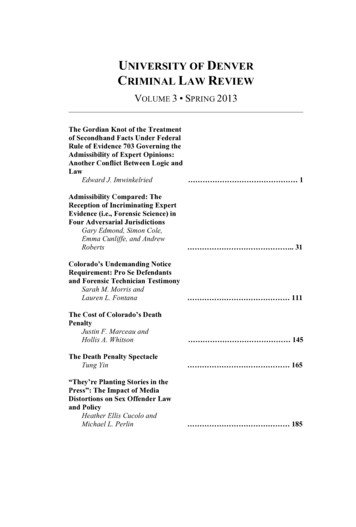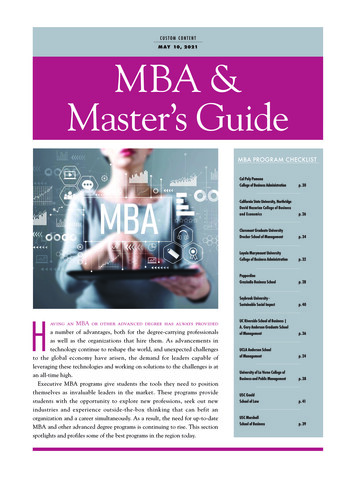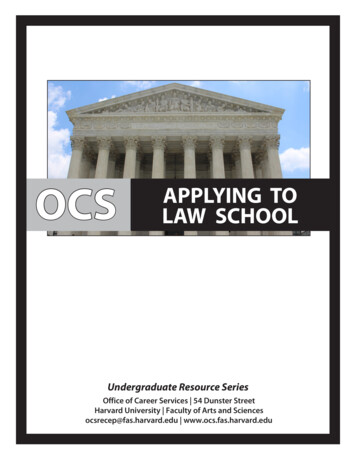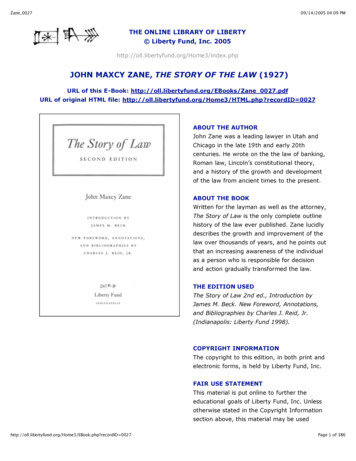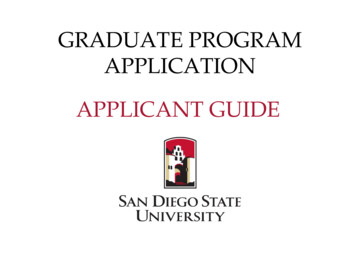
Transcription
TABLE OF CONTENTSChoosing your Target Law Schools.3Don Macaulay, Admissions DeanThe Role of The LSAT and UGPA in Admissions.5David M. Killoran, PowerScore Test PreparationThe Personal Statement.7Ann Levine, Law School ExpertTop 15 Law School Letters of Recommendation Tips.10Anna Ivey, Anna Ivey ConsultingExtra-Curriculars: What Matters and Why.12Jean K. Webb and David C. Mainiero, InGenius PrepDealing with Negatives on Your Law School Application.14Christina Taber-Kewene, Admit AdvantageDo You Need a Resume?.17Peg Cheng, Prelaw GuruThe Importance of a Diversity Statement.19Derek Meeker, Dean Meeker ConsultingWhen Should You Write the Optional Essay?.22Linda Abraham, Accepted.comThe Law School Addendum.24Eileen Conner, Pen and ChiselMaximizing Face Time With Admissions Officers AndOther Members Of Law School Communities.27Anne M. Richard, AMRichard ConsultingThe Wait List: What it Means and How to Get Admitted Off of It.30Mike Spivey and Karen Buttenbaum, Spivey Consulting Group
AdmissionsDean.comDon MacaulayPresident & Founder of AdmissionsDean.comadmissionsdean.comDon is a successful businessman, entrepreneur, and member of the senior management team at BARBRI. He successfully foundedthree profitable education-related businesses; one of which became the largest independent legal education bookstore in the U.S., andthe other two--Law Preview and AdmissionsDean.com--grew into recognized leaders in their respective markets. He is well knownthroughout the legal education field for helping law students succeed in law school, in their careers at practicing attorneys, and in life.CHOOSING YOUR TARGET LAW SCHOOLSCostThe law school application process begins andends with critical decisions about where to attendlaw school. First, you need to identify a handfulof schools to which you will apply. Later, afteradmissions decisions are made, you must determinewhich school to attend. Each school offers a uniquecomplement of services and features, so you shouldspend time gathering reliable information so thatyou can successfully identify the schools best suitedto your individual goals.According to a recent Government AccountabilityOffice report, most law students graduate withmore than 100K in debt. This type of debt canseverely limit your career options after law school(instead of pursuing your passion for public interest,you can’t afford not to work for a big private lawfirm instead) or your lifestyle (get ready for moreCup-O-Noodles!), so it’s important that you startthinking about ways you can begin your legal careerwith minimal debt.You have your work cut out for you: As ofSeptember 2014 there were 204 law schoolsapproved by the American Bar Association. Thereare three important considerations when it comes todeciding which school to attend: cost of attendance,job placement and educational quality.The downtick in law school applications pits lawschools against one another for qualified candidates.This means there has not been a better time to applyto law school because not only are you are morelikely to get into your “dream” school, but you arealso likely to get wooed with scholarships fromother schools vying for your consideration.There is a tension here—you want to get the bestdeal so you can graduate with minimal debt,but you do not want to sacrifice post-graduateprofessional opportunities by simply choosing theleast expensive school. Before making your finaldecision, you must determine if the added cost (orsavings) will enhance (or limit) the professionalopportunities after graduation.3Creating a Killer Law School Application
Choosing your Target Law Schools continued.The USNEWS law school rankings and itsunderlying methodology have received their fairshare of criticism over the years. For example,in 2009, reports by the Law School AdmissionsCouncil and the Government AccountabilityOffice criticize law school rankings for forcingsome schools to “game” the system and employquestionable admissions tactics to improve (or atleast maintain) their USNEWS ranking.Job PlacementYou may think it’s too early to think about whereyou will ultimately wish to practice, but it’s not. Alltoo often, students may choose a school that offersthe best deal without realizing that a degree fromthat institution may not be as valuable to their ownneeds as they may think. When considering whichlaw school to attend, make a list of the geographicareas (e.g., New York City, Washington, DC,Charlotte, NC, etc.) where you may like to settle.Then—like any good consumer—call the careerplacement offices at your selected schools and askwhat percentage of last year’s graduates obtainedemployment in those regions. This will give you agood idea about how portable a degree from thatlaw school is.A popular alternative to the US News ranking is theEducational Quality Ranking (EQR), published byBrian Leiter, a University of Chicago law professor.Unlike US News, EQR focuses exclusively on threefactors when determining its rankings: quality of thefaculty, quality of the student body, and quality ofthe teaching. A few law school deans have praisedEQR as a favorable alternative to the US Newsrankings. For a side-by-side comparison of boththe US News Law School Rankings and LeiterRankings, you can visit AdmissionsDean.com.Additionally, scour the job placement numbersreported by the various schools that offer you a spot.Consider things like median salary, employabilitypercentages and judicial clerkship opportunities. Itwould be unfortunate to pass on a law school whereyour chances of employment and earning potentialare higher, simply because you opted for a full- orpartial-tuition scholarship from another school.Most rankings systems neglect other significantfactors, including the racial and gender diversityof a school’s student body; the location of theschool; the cost of tuition and availability of loanrepayment assistance programs; average class size;variety of course offerings; availability of clinicaland externship programs; availability of part-timeand evening programs; commitment to technology;access to faculty; alumni support; and more. Be sureto consider these factors when choosing which lawschool is right for you.Educational QualityEducational quality is also an importantconsideration in choosing a law school. To assessthe quality of a school, many students consultseveral annual law school rankings that attempt tomeasure the quality of education. For instance, USNews & World Report’s Law School Rankings,published every March, compares law schools usingcategories such as: average student LSAT scores;average student undergraduate GPA; student/faculty ratios; application acceptance rates; graduateplacement success rates; faculty resources; barpassage rates; and academic reputation amonglawyers, judges, and law professors.www.powerscore.comThe choice is yours. You now have the method tosteer you in the right direction to make that criticaldecision. What school options will leave you withminimal debt, but also put you in an attractiveposition for future job placement? Which schooloffers the best educational quality for you? It is atough decision, but considering the above carefullywill help guide you towards the most optimaldecision.4
Dave KilloranCEO of PowerScore Test Preparationpowerscore.com (800) 545-1750Dave Killoran, a graduate of Duke University, is an expert in test preparation with over 20 years of teaching experience and a 99thpercentile score on a LSAC-administered LSAT. In addition to having written PowerScore’s legendary LSAT Bible Series, and manyother popular publications, Dave has overseen the preparation of thousands of students and founded two national LSAT preparationcompanies.THE ROLE OF THE LSAT AND UGPA IN ADMISSIONSIn the law school admission process, there are twonumbers that play a dominant role in determiningwhere you are admitted: your LSAT score and yourUGPA. Let’s briefly look at each.Let’s look at the sections that make up an LSAT: Two scored sections of Logical Reasoning (shortarguments, 24-26 questions in each section) One scored section of Reading Comprehension(three long reading passages, 2 shortcomparative reading passages, 26-28 totalquestions) One scored section of Analytical Reasoning(four logic games, 22-24 total questions) One unscored experimental section of one ofthe above three section types (the experimentalsection is not specified as such, and there is noway to determine which section is experimentalduring the test) You are given 35 minutes to complete each ofthe 5 sections, with a break of 10 to 15 minutesbetween the 3rd and 4th sections. An unscoredwriting sample is administered at a later date viaLSAC’s online platform.A Brief Overview of the LSATThe Law School Admission Test, or LSAT, isthe test required for admission to any law schoolaccredited by the American Bar Association. Sinceit is the test to get into law school, you might thinkthe LSAT would test your knowledge of the law, butit does not. Instead, the LSAT attempts to measurethe abilities and skills you will need to succeed inlaw school and as a lawyer.According to LSAC, the producers of the test,the LSAT is designed “to measure skills that areconsidered essential for success in law school:the reading and comprehension of complex textswith accuracy and insight; the organization andmanagement of information and the ability to drawreasonable inferences from it; the ability to thinkcritically; and the analysis and evaluation of thereasoning and arguments of others.”Note that while this writing section is unscored, lawschools will receive a copy of the writing sectionwith your score report.How do they measure these skills? By using varioustypes of questions, each designed to test specificabilities.The typical LSAT takes about 4 hours to complete,and you normally receive your scores back withinthree weeks. To register for the test, visit lsac.org.5Creating a Killer Law School Application
The Role of the LSAT and UGPA in Admissions continued.So, if you are currently in college, make sure thatyou maximize your grades in your remainingcourses. And, even though your UGPA may belargely determined at the point, the LSAT is stillwithin your control. Use this information to youradvantage: if your GPA is below the median for theschool of your choice, a relatively good LSAT scorecould make you more competitive, and if your GPAis well above the median for your dream school, arelatively high score on the LSAT could help earnyou a spot (and perhaps a scholarship!).A Brief Overview of your UGPAYour Undergraduate Grade Point Average (UGPA)is based on your grades from your undergraduateyears of college. These grades come from yourofficial school transcripts, which are processed byLSAC’s Credential Assembly Service (CAS) andthen distributed to each law school to which youapply.When you submit your grades to CAS, theystandardize the results onto a 0.0 to 4.0 scale,and release a variety of results, including yourcumulative GPA, undergraduate GPA, and GPAwithin your major. The undergraduate GPA is themost important of these figures (and more importantthan a graduate GPA, if you have one).How to Prepare for the LSATBecause your UGPA is the product of four or moreyears of work, it is difficult to change that numberin a short period of time. The LSAT, on the otherhand, is much easier to change since it is only asingle four-hour test.The Importance of the LSAT and UGPAin Law School AdmissionsFortunately, everyone can be trained to understandthe logic of the LSAT, although various learningstyles necessitate different approaches to preparing.Some students learn effectively working with booksor tests on their own, while others benefit fromthe interaction of a live lecture. An online coursecan be a great option for some, while others seekthe assistance of a personal tutor. In deciding whatwill work best for you, start by considering yourparticular learning style.You may be surprised to learn that your LSATscore and UGPA are the two most important factorsin determining which law schools will offer youadmission. In fact, at many schools, your LSAT andUGPA are combined by a formula that produces asingle “index number” for each candidate. Whencandidates are examined, the individuals with thehighest index numbers are considered first. Theinfluence of this index is so important that LSACeven has an online tool where you can input yourLSAT score and UGPA and receive an assessmentapproximating your percentage chances of gettingin to each school.Note that the different approaches can varysignificantly in cost. Books are typically the leastexpensive option, but you have to be motivated tostudy and be a good self-learner. Courses are moreexpensive but they often provide a lot of material,along with a set schedule and general study plan.Tutoring tends to be the most expensive approachbut it is completely personalized and focused solelyon your needs, which can make this approach anefficient one.Of course, your LSAT score and undergraduateGPA are not the only factors that admissionscommittees will examine, but they will typicallyoutweigh your personal statement, work history, andrecommendations. Why is this the case? Becausethey provide hard numbers with which to comparestudents (as opposed to the “soft” factors involvedin personal statements and recommendations) andbecause the LSAT allows for all applicants to becompared across a single objective scale.www.powerscore.comHowever you choose to approach the LSAT, makesure you perform as well as possible. And if youcan combine a good LSAT score with a solid GPA,you’ll be in great shape at law school decision time.6
Ann LevineChief Law School Admissions ConsultantLaw School Expertlawschoolexpert.com (805) 604-5039Ann Levine is the president and chief law school admission consultant at Law School Expert, author of bestselling law schooldmission guide The Law School Admission Game: Play Like An Expert, and the former director of two ABA-approved law schools.She has personally guided over 2,000 law school applicants through the law school admissions process.THE PERSONAL STATEMENT1. Use Your Own Voice2. Surprise the ReaderThis is about the tone of your essay.By the time someone reads your personal statement,she will already know your GPA, LSAT, workhistory, honors, awards, activities, etc. Whatmight that person assume about you from thisinformation? Really think critically about yourself(just not to the point where you make yourselfparanoid).The point of the personal statement is for the readerto like you and want to pass you in the halls everyday for the next three years, so keep that in mindas you write that very first draft. It’s important tobe likeable and to create the impression that youwill be an alumnus who will reflect well on the lawschool.Will your transcripts make you look lazy? If so, tella story that shows how hard working and focusedyou are. Likewise, if your transcripts show you’rea near-perfect student, and you have the LORsand resume to back it up, then share somethingsurprising in the personal statement by gettingpersonal. Show them you’re more than what theythink you are. If you graduated college in 3 yearsand you’re 21, demonstrate maturity. If you wentto fancy private schools, recount tales of howyou competed for scholarships and worked as abartender to pay your bills. If you appear to be thetypical fraternity guy or jock, share your love ofreading or museums.Don’t try to sound how you think a personalstatement should sound, and certainly (please!)don’t try to write one of those cheesy personalstatements you saw in some book of sample lawschool personal statements. I always advise myclients to attempt the first draft as though they arespeaking the words instead of writing them.This is not an academic paper, and if you try towrite how you expect lawyers to write, (using lotsof big words) you’ll just make a fool of yourself.A good personal statement allows the reader to getto know you and to like you, and this means takinga conversational (but not too informal) tone. Asuccessful personal statement lets the reader get toknow the writer.However, this approach only works if the storyyou’re telling is true, because admission committeeswho have read tens of thousands of personalstatements can spot the B.S. pretty quickly.7Creating a Killer Law School Application
The Personal Statement continued.D. High school events—“In high school, I wasa championship softball player and earned 6AP credits.” (High school can be appropriateto mention if there’s a specific episode thatprovides a point you’re trying to make suchas “My parents divorced during my junioryear of high school, and suddenly I learnedI would have to bear the cost of collegemyself as a result I worked 30 hours aweek during my freshman year ”)3. Avoid ConclusionsA good personal statement never says “I am a hardworker,” or “I overcame obstacles,” or “I neverquit.” Rather, it tells a story that convinces thereader to come to the conclusion(s) on his/her own.How do you do this? By providing facts and tellinga true story that shows the conclusion you’re tryingto prove. This is how you succeed on law schoolexams as well, and the best way for a lawyer tomake an effective argument is to use the facts of thecase; start with your law school personal statement.I think there is a misconception that personalstatements must be about overcoming paralysis orpoverty. You don’t have to apologize for havinga privileged life—just show what does make youinteresting/different/remarkable. Some of my clientshave distinguished themselves in non-traditionalways by doing things they never even consideredmentioning in their law school personal statements.One has a huge readership on her crafts blog.Another ran an online gaming community. Don’tunderestimate what you have going for you.One of my pet peeves when I was reviewing lawschool applications as director of admissions wasreading statements like “My strong work ethic ”and then not really learning anything remarkableabout that person’s work ethic. This is the time toshare that you held two jobs in college and went to aprofessor’s office hours weekly to catch up with thegrad students enrolled in the 500-level course andhow you worked like crazy to earn that B- and itwas one of your best accomplishments.Do not reuse your college personal statementwherein you contemplated lumps of peanut butter.Stay away from anything that will make you appearto be high maintenance, such as recounting the timeyou fought the dean of students about the professorwho had a grudge against you because you werelate to her class once.If you provide persuasive facts, the reader will makethe right conclusion naturally.4. Consider Your ContentSome topics that have become trite and overusedinclude:A. The injured athlete story—“It was difficultto leave the team after I worked so hard forso many years ”;B. The typical study abroad story—“I learnedto drive on the wrong side and to usechopsticks ”;C. Current historical events—“Obama’s rise tothe nomination inspires me ”; andwww.powerscore.com8
The Personal Statement continued.5. Use Your Words Wisely6. Trust Your JudgmentSpell correctly.Of course, it’s a good idea to have another set ofeyes on your personal statement before you submitit; after you look at something a hundred times,it’s hard to spot the errors yourself. However, becareful about passing your essay around to lawyersand English professors and parents and friends.A personal statement is such a different type ofwriting and its purpose is so specific that unlesssomeone has had experience making law schooladmission decisions, they probably have only readone personal statement—their own.Punctuate correctly.Don’t use ten words when three will do. (Sorry ifI’m quoting “Ocean’s 11” here.)Think about what you’re writing—there is no reasonto start with “My name is ” when your name is atthe top of the paper. Refrain from repeating thingsthat the reader will already know about you (jobdescriptions, awards won, etc.).Your informal advisors will probably expect thatyou should spend your essay talking about how yourparents told you at age four that your negotiatingskills were evident and that you are a top publicspeaker and your friends always seek your advice.Be strong enough to decide against taking certainadvice. And, if you decide to seek professionalassistance with your law school personal statement,find someone who has actually made law schooladmission decisions and can give you an honestassessment of your content, presentations, writing,and overall application.There is no reason to use certain words. Forexample, “personally”—it is a personal statement;it had better be personal (again, sorry for the“When Harry Met Sally” reference). Same goesfor “unique” and “In conclusion.” Also, don’tmention a law school’s name unless you’re goingto say something specific about the school that ismeaningful.Lastly, just because Boalt says you can write fourpages doesn’t mean you should stretch things outto fit four pages. You get bonus points for beingsuccinct.9Creating a Killer Law School Application
Anna IveyFormer Dean of Admissions, University of Chicago Law SchoolAnna Ivey Consultingannaivey.com (617) 949-6500Anna Ivey is the former Dean of Admissions at the University of Chicago Law School and founder of Ivey Consulting. She and herteam help college, law school, and MBA applicants make smart decisions about their higher education and navigate the applicationprocess. She is the author of The Ivey Guide to Law School Admissions. Learn more at www.AnnaIvey.com.TOP 15 LAW SCHOOL LETTERS OF RECOMMENDATION TIPS1. Assume that schools prefer academic recommendations unless they specifically request a professionalone. An academic recommender is someone who has taught you in a college classroom environment,graded your papers, led your discussion sections, etc.2. Law school recommendations are not meant to be character references; they should focus on you as astudent. Any thoughts they share about you outside the classroom are just bonuses; they are not requiredor expected. Recommendations are also not expected to discuss other parts of your application, like yourextracurricular activities while in college.3. Less is more. Have good reasons for submitting more than the required number of recommendations. Infact, have a good reason for submitting anything as part of your application that isn’t required.4. Use LSAC’s Credential Assembly Service to submit your recommendations for your applications.When the online system asks whether you’re submitting a “recommendation” or an “evaluation,” select“recommendation.”5. The longer you’ve been out of school, the less admissions officers expect to see an academicrecommendation, and the more appropriate it is to submit a professional one. Keep an eye out forthe exceptional schools that do prefer a professional recommendation; they will tell you so in theirapplication instructions.6. The recommender’s job title is never more important than the closeness of the relationship. The TeachingAssistant might have more meaningful things to say about you as a student than the name-brandprofessor does. Recommendations from famous people, politicians, or other VIPs are useless; don’tbother.7. Recommendations should be mainly backward-looking, offering an opinion on you as therecommender’s student (or employee, if a professional recommendation). Recommenders are notexpected to predict how you’re going to fare as a law student in particular, or as a future lawyer, butthey are expected to know your past academic work in their class well enough to assess your academicqualities.www.powerscore.com10
Top 15 Law School Letters of Recommendation Tips continued.8. Anecdotes and stories make a recommendation memorable. A bunch of adjectives, even superlativeones, do not. If a recommender invites your input or guidance, ask her to give examples that back up heropinions. It also helps if she can put you in the context of the other students she has taught.9. Never ask to see a draft. If recommenders ask for you input, it’s great to give them input. If they showyou a draft, you are absolutely allowed to see it even if you’ve signed the waiver on the application form,but never give recommenders the impression that you expect to see what they have written about you.10. It’s always a good idea to prep your recommenders. You can help them understand your motivations forpursuing law school (you want to signal to them that you have thought through this big decision, and thatyou are not applying to law school just because it’s the path of least resistance). Help them understand inbroad strokes how you are positioning yourself in your application.11. When requesting recommendations, give your recommenders an “out.” If they express any hesitation,move on and find someone who is enthusiastic about writing you a meaningful letter.12. Do not write your own letter, even if a recommender asks you to (“draft it and I’ll sign it”). Admissionsofficers would not consider that ethical or useful, and even if it were, self-written letters tend not to bevery good. (Try writing one sometime. Unless you are a narcissist, it’s hard to say truly stand-out thingsabout yourself. And you can’t read your recommender’s mind or write in his voice in any event.)13. Be mindful that you are asking recommenders to spend some of their reputational capital on you. Don’tabuse that courtesy.14. The most important thing for you to do is pick the appropriate recommenders and guide them asrequested. After that, it’s out of your hands. Give them a deadline to submit their letters — at least sixweeks before you want your applications to be complete (four weeks for them to write the letter, two forLSAC to process it). Your LSAC account will show when each letter has been received. Follow up withany tardy recommenders as soon as possible after the deadline you have given them.15. After you know where you will be starting law school, follow up with your recommenders and thankthem. They are part of your network, and they actually care about your success. Stay in touch.11Creating a Killer Law School Application
Jean K. Webb and David C. MainieroFormer Director of Admissions, Yale Law School& Director of JD/LLM Counseling, Ingenius Prepingeniusprep.com (800) 722-3105InGenius Prep is an admissions consulting firm that specializes in law school application counseling and advising pre-law studentson making strategic decisions early on to build their candidacies for law school. With more than sixty former admissions officers(including counselors Yale Law School, Harvard Law School, Columbia Law School, and Stanford Law School) and more than 70top graduate coaches, InGenius Prep brings centuries of collective knowledge and experience to bear on each of its students’ uniquelaw school application strategies.EXTRA-CURRICULARS: WHAT MATTERS AND WHYExtra-curriculars don’t matter.Debate, student government, mock trial, moot court,student publications, and Model United Nationsare all conventional extra-curricular activities thatcan boost your candidacy for law school. However,if there were one sentence in this article that wewish you would forget we ever said, it would be theprevious sentence.We’re sure you have heard this law schooladmissions trope repeated to you by casualobservers of the law school admissions process.Simply put, these people are unequivocally wrong.If they were right, admissions officers would havebeen replaced long ago by computers that calculatethe several thousand applicants’ GPA and LSATscores on a numerical index and print out decisions.Now that we have that out of the way, let’s get backto talking about extra-curriculars.While there are a handful of extra-curricularactivities like these that hone the core set of skillsthat are crucial to success in law school, theseactivities or experiences should be consideredmerely a means to an end. In short, what matters isthat your extra-curricular activities evince a passionfor the law or the constituent skills that engender“good lawyering.” Activities that showcasean applicant’s sound character and judgment,independence of thought, analytical ability,effectiveness of oral and written communication,leadership ability, and personal initiative are alwaysvaluable additions to a resume or CV. Remember,unlike undergraduate institutions, law schools donot need to fill spots in orchestras or sports teams,so they do not need to look for that particular brandof diversity of extracurricular interests and skill,except insofar as they are ancillary indicia of anotherwise strong candidate.As you probably anticipated, we were being abit facetious in saying that extra-curriculars donot matter. They do. What matters more than theextra-curricular activity, though, is you. Your extracurricular involvement should be an extension ofyourself; it should both advance and reflect yourinterests, passions, hobbies, skills, and aspirations.As you have almost certainly heard elsewhere,breadth of extra-curricular involvement can begood, but depth is almost always better. Being
The Law School Admission Test, or LSAT, is the test required for admission to any law school accredited by the American Bar Association. Since it is the test to get into law school, you might think the LSAT wou





